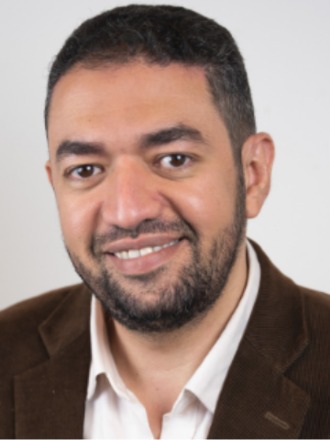AI helps find a needle in a medication haystack

Finding new medication for diseases like cancer and HIV takes time, a lot of time. That is why Muhamed Amin, Assistant Professor at University College Groningen, takes a different approach. In this edition of JTS Scholars, he explains how he develops AI algorithms to identify promising drugs in large databases.
Text: Cecile Bruil (student Science Communication at the University of Groningen)
About the JTS Scholars
A ‘JTS Scholar’ is a researcher (from postdoc to professor) affiliated with the University of Groningen who conducts research in fields related to the Jantina Tammes School: digitalization, digital technologies and artificial intelligence. In this series, we interview our Scholars about their expertise and future plans for interdisciplinary collaboration.
You can read the other interviews on our overview page.
There are thousands of types of molecules, each with slightly different structures. Some are able to bind to a protein, while others are not. When a molecule binds to a defective protein, it can block that protein’s function, preventing disease from developing. A molecule that binds effectively to a target protein could therefore serve as a potential drug.
But finding such a molecule is no easy task. Amin is currently searching for a molecule that can bind to the so-called KRAS protein. A mutation in this protein causes uncontrolled cell growth in cancer patients. 'If you can find a molecule that binds to a KRAS protein, you might be able to use it as cancer medication,' Amin explains.
The protein acts like a lock that needs to be opened. The molecules you are looking for are like keys on a massive keychain, most of which do not fit the lock. Using artificial intelligence (AI), Amin can look for the right key without having to test each one. 'We scan thousands of molecules to find a single one that binds,' he says. 'Instead of testing hundreds of molecules in the lab, we start with AI predictions.'
Building the Models
To make these predictions, Amin uses data, a lot of it. These datasets come from existing sources such as ChEMBL or the Protein Data Bank. He then develops an AI model designed to scan and interpret that data. The model is trained to recognise patterns in the data and use those patterns to make predictions.
According to Amin, creating a reliable model is difficult and requires a deep understanding of AI. 'People often think it’s a black box, you press a button and get an answer. That’s not how it works; you really need to understand what you’re doing,' he says.
Designing an AI model that can find the right molecular key for the protein lock is particularly challenging. The database contains thousands of molecules, but only a handful actually bind to the protein. This makes it easy for the model to overlook the few that matter. 'If your model misses all ten correct molecules out of a thousand that don’t fit, it may still appear accurate because you’ve only made ten mistakes,' Amin explains. 'That sounds good, but it actually means your model performs poorly.'
Once an AI model works well, it can be applied to different diseases, the Assistant Professor notes. He has already used the same model for projects related to HIV, Covid-19, and others. The principle remains the same: an AI model that can identify useful molecular keys while ignoring the rest.
Combining Expertise
What makes this project so fascinating to Amin is its combination of insights from multiple fields. It requires expertise not only in AI, but also in biology and chemistry. Amin himself has a background in electrical engineering, but during his PhD he began combining AI with biophysics. 'I really enjoyed biophysics, and the overlap between electrical engineering and biophysics was programming.' He continues to combine these disciplines today at University College Groningen.
To advance his project, collaboration is essential. 'Your expertise is concentrated in one specific area, so you need to work together to learn more,' Amin says. 'We collaborate with Yale University, the Max Planck Institute, and many other institutions.'
Because of the interdisciplinary nature of his research and his active collaboration with other sectors, Amin received the Jantina Tammes School Scholarship from the University of Groningen last year. 'Now more than ever, it’s important for people to really understand how AI works,' he says. 'That’s why I received the grant, not only to continue my research, but also to share that knowledge.'
Amin shares his knowledge by giving workshops on AI to students in Groningen. He also plans to use the scholarship to create internships that allow students to conduct AI research. 'We have all sorts of ideas we still want to realize,' he says with a smile.
Staying Ahead
The first results of the search for molecules that can block the KRAS protein are already in. Amin has found several molecules that bind to and inhibit the protein. This could be a step forward in the development of new cancer treatments, 'but it’s not yet commercially available because the compounds still need to be optimized,' he explains. That process can take years and is left to pharmaceutical companies. They will test the molecules Amin identified in the lab to potentially turn them into 'real' cancer medication.
Once Amin has published his findings, he considers the project complete and moves on to a new database to search for molecular keys to other diseases.
Amin emphasizes that rapid developments in the AI field are crucial to avoid falling behind other countries. 'It’s become a competition, and you need to stay in it to achieve results,' he says. AI applications are expanding every year, so AI education must also keep evolving. As a lecturer, he is committed to this mission. 'You don’t want to miss the boat, because AI is changing everything at lightning speed.'
More news
-
15 September 2025
Successful visit to the UG by Rector of Institut Teknologi Bandung

